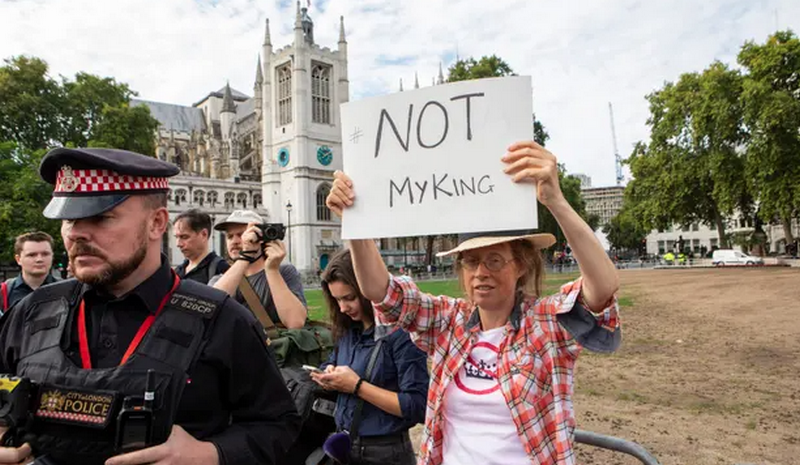Being a republican in Britain used to be perfectly respectable. So why are people now getting arrested for it?

The Guardian - Zoe Williams - Mon 12 Sep 2022 13.52 BST
A woman in Edinburgh was arrested at the weekend for holding a sign that said: “Fuck imperialism, abolish the monarchy.” In Oxford, an even milder protest resulted in the arrest of Symon Hill. He emerged from the church as the proclamation for King Charles III was being read, and called out: “Who elected him?”
Over the years, the conversation has been steadily closed down so that you can no longer voice anything but adoration
There is a question mark over how disruptive that was, in the great scheme of things, but it was enough for the police to arrest and handcuff him, later to de-arrest him on the understanding that he would be questioned in the future. Hill says that, at the time, they told him they were acting under the new Police, Crime, Sentencing and Courts Act (2022), though they later described it as a potential public order offense.
I know all this only because I follow Hill on Twitter, but is it wise to admit that? Who knows how far the powers of the new act extend? The police sure as hell don’t seem to.
I will truncate the obligatory sentiments (it is sad when anyone dies; respect must be paid to such a peerless sense of duty), on the understanding that you know all that because you are not a robot. For now, let us just pause to consider British republicanism, which used to be a perfectly acceptable position, quite within the range of polite debate, and definitely not something you could be arrested for.
This is going back a while, to before the death of Diana, which was arguably the trigger for our modern royalist absolutism. It is all a bit of a paradox. That tragedy at the time looked as though it might start a wider conversation: what do we expect of this family? Do we want them to emote or be stoical, open or reserved, human or superhuman – and is it reasonable to ask for all those things at once? In the end, the opposite happened: all conversation was steadily closed down, to bring us to now when, if you voice anything but blank-faced adoration, you could get a brick through your window.
Before all that, there were distinct strains of republicanism. There was a mild, wonky, Lib Dem-ish faction who liked all the royals personally but felt that if we were ever going to get the constitutional reform we so richly deserved, we couldn’t very well leave the pinnacle undisturbed. It was as a Lib Dem (later president of her university Lib Dem group) in 1994 that Liz Truss said: “That people, because of the family they’re born into, should be able to be the head of state of our country?
I think that’s disgraceful.” She was clearly playing to the crowd, but she had actually, and not uncharacteristically, got the wrong crowd. She was voicing center-left anti-royalism, which disapproved of the institution because it wasn’t democratic or meritocratic. This kind of Republican talked a lot about how on earth Prince Charles got into Cambridge with two A-levels.
The left-left republicanism was different and centered on the inequality that was not just iterated but celebrated by the royal spectacle. What kind of a country could watch someone on a golden throne, wearing 20m quid on their head alone, and think that was a good thing? There was a nascent, allied de-colonialist case: how can we atone for our imperial past while its beneficiaries-in-chief are still so visibly benefiting? Nobody really listened to them, though.
Finally, the intellectuals – not necessarily left, center, or right, just aesthetic – who thought the royals made us look a bit silly. Pomp without ballast, ceremony without meaning: would it not be better if we all grew up a bit? That royalism is a bit childish is possibly now the most unsayable thing. I can’t emphasize enough how respectable that position once was. I had a question about it in my general studies A-level: “The existence of a monarch infantilizes the people. Discuss.”
Personally, I’m pretty happy about King Charles, even if I have yet to say those words out loud without adding “spaniel”. He is a committed environmentalist at a point when the government is full of climate change deniers. Sure, I would rather not be relying on a figurehead as a change-maker, but I’d take him over any other.
Or am I just saying that to stay out of jail? Truly, this is the dark timeline.

Zoe Williams is a Guardian columnist
CHARLES’ EMPIRE: THE ROYAL RESET RIDDLE - SEP 10, 2022
Editors Comments:

HUMAN SYNTHESIS
COPYRIGHTS
Copy & Paste the link above for Yandex translation to Norwegian.
WHO and WHAT is behind it all? : >
The bottom line is for the people to regain their original, moral principles, which have intentionally been watered out over the past generations by our press, TV, and other media owned by the Illuminati/Bilderberger Group, corrupting our morals by making misbehavior acceptable to our society. Only in this way shall we conquer this oncoming wave of evil.
All articles contained in Human-Synthesis are freely available and collected from the Internet. The interpretation of the contents is left to the readers and does not necessarily represent the views of the Administrator. Disclaimer: The contents of this article are the sole responsibility of the author(s). Human-Synthesis will not be responsible for any inaccurate or incorrect statement in this article. Human-Synthesis grants permission to cross-post original Human-Synthesis articles on community internet sites as long as the text & title are not modified.
HUMAN SYNTHESIS